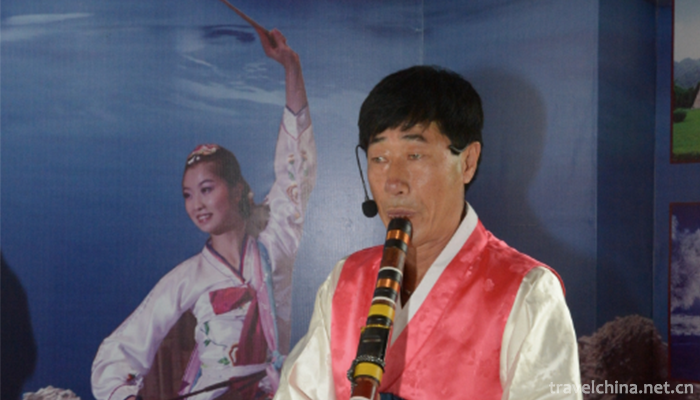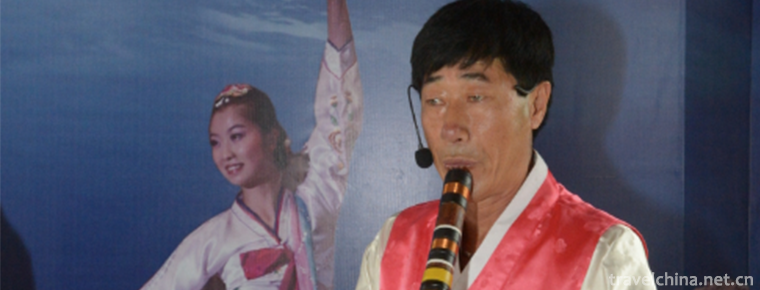Korean Dongxiao Music
Korean Dongxiao Music
The Koguryo History Music Records records that Dongxiao belonged to the musical instruments of the Tang Dynasty in China. During the period of Shizong in the Li Dynasty, it was introduced from West Asia to the Korean Peninsula via China. It is a unique and most representative traditional instrument of the Korean nationality in China. It has a history of 1500 years. According to historical records, in the middle of the fourth century, Gaogouli murals, there have been scenes of playing "Xiao" as an instrument. Since the 14th century, Xiao has been improved into Dongxiao and used in music practice. It has gradually become a traditional instrument of the Korean nation.
On June 7, 2008, Korean Dongxiao Music was approved by the State Council to be included in the second batch of national intangible cultural heritage list.
historical origin
As one of the most popular instruments among Korean people, Dongxiao (also known by scholars as tube xiao) plays an important role in the inheritance and dissemination of Korean folk music with its unique tone, performance style and artistic style. However, from the perspective of academic research of ethnomusicology, it has not attracted enough attention for a long time. This paper analyses and summarizes the characteristics, social functions and background of such musical cultural phenomena. On the basis of collecting data and field investigation as widely as possible, it combs and studies Korean Dongxiao and Dongxiao music with the research methods of Ethnology and musical morphology. The Dongxiao music and its folk activities in Mijiang Township of Hunchun City in Yanbian Korean Autonomous Prefecture of Jilin Province were investigated in detail. Through investigation and comprehensive study of literature, this paper traces the Korean national origin and Dongxiao music, and takes "Dongxiao Township" of Mijiang River as a typical case, the characteristics of Korean Dongxiao music.
artistic characteristics
In June 2008, Korean Dongxiao music was listed in the second batch of national intangible cultural heritage list.
Korean folk music, with its distinct characteristics, is unique in the music of ethnic minorities in China. It keeps the national style well and shows its tenacious vitality. However, with the development of society, like many other forms of folk music in China, the survival and development of Korean folk music is also facing unprecedented severe test.
Inheritance significance
Mijiang Township in Hunchun City is a well-known "Korean Dongxiao Township". Korean Dongxiao Art was listed in the national intangible cultural heritage list in 2008, and was awarded the title of "Town of Chinese Folk Culture and Art" by the Ministry of Culture of the People's Republic of China, and then awarded the title of "Town of Chinese Korean Dongxiao Art" by the Association of Chinese Folk Literators and Artists.
In order to further enhance the cultural atmosphere and influence of Mijiang Township and promote the construction of spiritual civilization in the whole town, Mijiang Township spontaneously organized Dongxiao fans to learn Dongxiao, practice popular tunes and rehearsal programs, and established a Dongxiao Association composed of more than 70 members. Mijiang Village, Mijiang Township, has a resident force. The development history of Mijiang Village is always linked with this force. In 1996, the village and the army formally formed a military-civilian co-construction unit. With concerted efforts, the village actively carried out activities such as rural grass-roots organization construction, new rural construction, poverty alleviation and poverty alleviation. Teacher Li Jisong, a provincial inheritor of intangible cultural heritage, went into the barracks and organized officers and soldiers to learn Korean Dongxiao culture. The officers and soldiers of the army changed their curiosity to love Dongxiao music. They practised diligently in their spare time. In less than two months, they played a popular Korean folk song "Alirang". The team's enthusiasts said that the Dongxiao is a very attractive traditional Korean musical instrument, greatly enriching the spiritual and cultural life of the army, they will continue to practice the Dongxiao performance, carefully rehearse programs, and perform in festival activities.


-
1.Cold Noodles with Sesame Sauce
Cold Noodles with Sesame Sauce are also called cold noodles
Time 2018-10-12 -
2.Lhanagtso RakshasTime 2018-10-12
-
3.Fanggan Ecological Scenic Area
Fanggan Eco-tourism Area is located in Luye Township in the north of Laiwu City. It is bordered by Jinan in the north, Zibo in the East and Taian in the west. National Highway 09 is very convenient fo
Time 2019-01-12 -
4.Talking about ancient times
Telling the ancients means telling books and stories. It is a traditional language performing art form in which ancient artists use Quanzhou dialect in Minnan language to re-create and deliver novels
Time 2019-05-05 -
5.Ningde Huo Boy Line Lion
Ningde Huo children's lion is a traditional folk culture, which controls the lion's movement and expression through silk thread. Line lion is mainly pulled by head rope, tail rope and parotid rope, so
Time 2019-06-08 -
6.Daoism in Northern Shaanxi
As one of the traditional folk songs in northern Shaanxi, Daoqing in northern Shaanxi was originally called "Qingjian Daoqing". Later, because "Longdong Daoqing" and "Shenchi
Time 2019-06-13 -
7.Sichuan University
Sichuan University is a national key university directly under the Ministry of Education, and a high-level research-oriented comprehensive university with national layout and key construction in Weste
Time 2019-08-30 -
8.Beijing University of Civil Engineering and Architecture
Beijing Architectural University is a pilot University jointly constructed by Beijing and the Ministry of Housing and Urban-Rural Construction, the "Education and Training Plan for Excellent Engi
Time 2019-09-06 -
9.Western Grand Canyon
Synonyms Western Grand Canyon hot spring generally refers to the Western Grand Canyon
Time 2020-10-16 -
10.Neijiangs first industry
In 2019, the sown area of grain crops in Neijiang is 309600 ha, an increase of 0.3% over the previous year; the sown area of oil crops is 79900 ha, an increase of 0.4%; and the sown area of vegetables is 78100 ha, an increase of 2.3%. The total grain output
Time 2020-12-16 -
11.Yibin transportation
Yibin is a transportation hub city in South Sichuan, which is famous for its comprehensive three-dimensional transportation network of water, land and air. It is located at the starting point of the golden waterway of the Yangtze River and the strategic point of Sichuan Yunna
Time 2020-12-18 -
12.Dazhou Railway
Railway lines: Chengdu Chengdu Railway, Xiangyang Chongqing railway, Dazhou Wanzhou railway, Daba railway and Chengdu Dazhou Wanzhou high speed railway (planned)
Time 2020-12-20